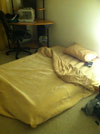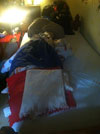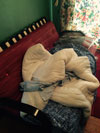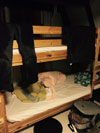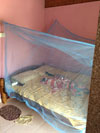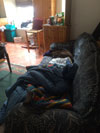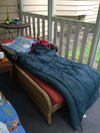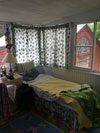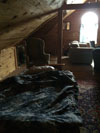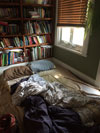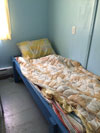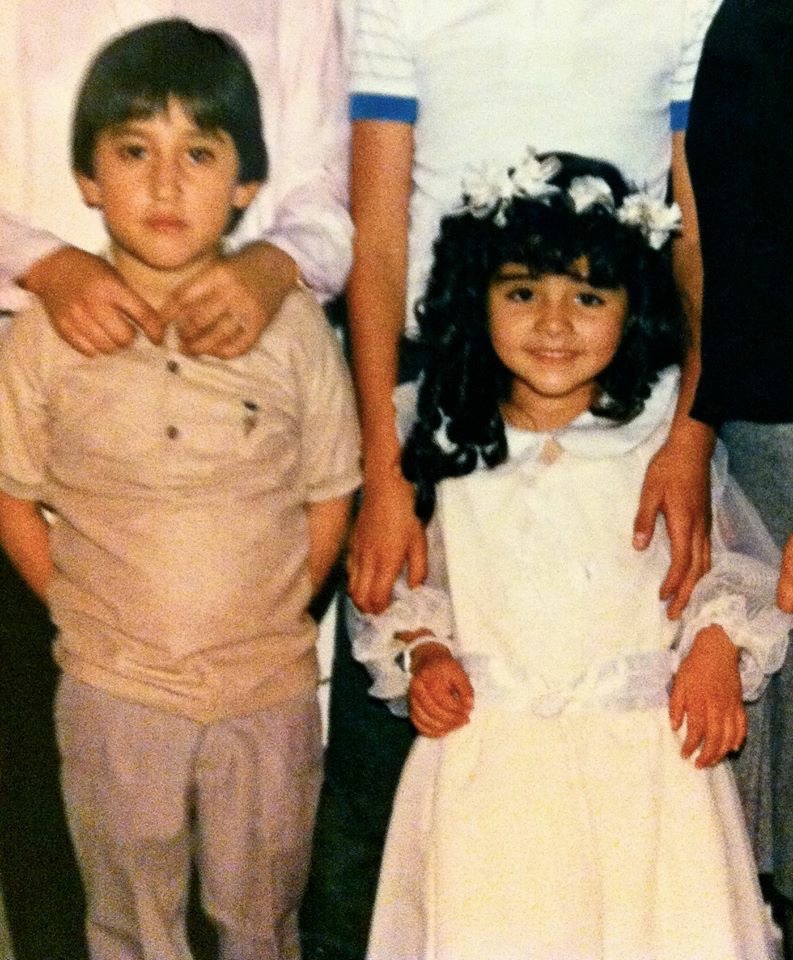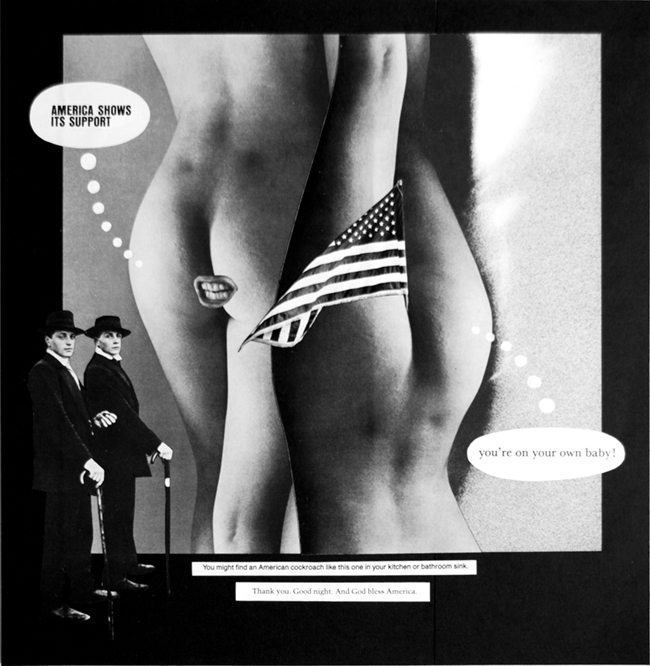MY MOTHER’S LODGER (1996)
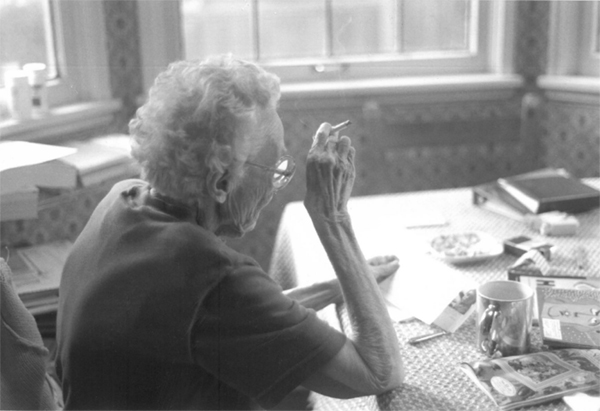
— I hardly called anybody the whole time I was in Portland. Then when I was back in Paris, I was worried all my Portland friends were mad at me. What happened was, when I got to my mother’s house in Portland, something wasn’t normal, wasn’t right. So my time there was completely taken up with that. I had no time for my usual Portland fix, laughing myself silly with old friends. None of that. I had no time for fun.
I arrived at Mom’s thinking she had forewarned her lodger that I was coming from Paris for three weeks and would be staying in my old bedroom, the one across the hall from the one he was renting for the huge sum of $100 a month. I thought he knew I’d be taking the upstairs phone away from him for the three weeks. But when I got to the house, I went upstairs and got hit in the face with an unclean, almost unholy smell, the likes of which I’d never associated with my mother. It had to be his smell. Then I discovered his room was locked with the phone inside. It was upsetting. Even though the phone was jacked in his room, I’d told Mom long distance from Paris that I’d get a long cord and take the phone into my room. First I’d told her I’d like an entirely new phone line installed, that I’d be happy to pay for it.
“No, I don’t think so,” she’d demurred coldly, abruptly. Still her assertive self at 88, iron will intact. The old guillotine flash of anger: “Just use his phone, that will do fine.”
“What if he objects?” I’d said sarcastically across the great waters. I wasn’t totally weaponless against my mother, but she’d gone on to another subject, so maybe I was.
And she’d had her way, a tiny but tough old lady. No new phone line was installed. It was, of course, her decision to make. It was still her house, her great comfort, the place she expected to wake up dead in one day, never having had to leave it for some pointless stop-over on the way to stillness.
Stillness after a simple fade to white, that’s how Mom imagined dying. She saw nothing more elaborate happening. Living and dying were just movement followed by stillness. Mom was an atheist as far as I could tell. I’d never seen her doing any kind of spiritual thing. What Mom believed in was doing the smart thing, for its own sake, not for any ulterior payoff. Doing the smart thing would have its own payoff in the here and now. It was similar to the idea of good habits getting you through rough periods. And if you had to ask what either the smart thing or good habits might be, you were hopeless.
“That’s not smart,” Mom would fiercely snarl at some idiot behavior or other, and if it was me doing it, I viscerally remember the chill that would settle over me, over my not-smart, hopeless self. Whatever it had been, I probably never did it again. I remember too how she’d say “Flap your wings! You’re smart!” as she pushed me out of the nest, and I certainly learned how to flap.
And this woman set good examples for doing the smart thing: For instance, she had figured out twenty years earlier what the smart thing would be to enable her to keep living on into her old age in her own house, alone after my father’s death. One day she walked across the street to the Baptist Theological Seminary, put up a notice for a room to rent to a student, and within a week, she had a girl from The Philippines who was perfect, perfectly reliable, perfectly Christian, perfectly boring. After the Filipina came another perfect lodger, then another. Several of them stayed two years. One stayed four years, his entire experience at Seminary.
My brother and I never worried about Mom as long as the Christians were there. She never worried either. All of us, atheist, or whatever, were reassured by those Christians. We never worried when she went off to China or the Middle East or the South Pacific for a month, leaving her house and her cat in the safe, trustworthy hands of her lodgers. Mom grew fond of several of them, the odder ones I noted. And all of them understood she wouldn’t tolerate any kitchen-table proselytizing. Not a single word about the Lord need be uttered, not a single tract brandished as she sat at the kitchen table happily smoking cigarettes. She would smoke with her left hand and play solitaire with her right, only half listening to anyone who might be talking to her. Mom’s other rule was that her lodgers had to stay in school. They had to stay registered at the Seminary, as this was proof of goodness.
When I got to Portland and smelled that godawful smell and found the lodger’s room locked with the phone inside, I went to bed that first night worrying. Fraught with jet-lag, I heard the guy’s door open in the middle of the night. I jumped out of bed and ran out in the hall in my pajamas.
“I need to have the phone,” I said to the tall shadow in the darkened hallway. He breathed in, turned abruptly, stepped back in his room, shut the door. Had I scared this giant? I was thinking. This smelly giant. Yes, it was he who smelled. He smelled of old sweat and tennis shoes, and something else I couldn’t identify from only one whiff. His smell was startling in the middle of the night. Distracted, I went back to bed and couldn’t fall asleep. The smell lingered. I fretted and thrashed around. The jet-lag kept me alert. I smelled the smell even when I covered my face with the sheet.
The next morning at eight o’clock, I awoke abruptly. I must have drifted off. I lunged out of bed and into the hallway, up against the lodger’s door. “Give me the telephone,” I said evenly. There was no response. Perhaps he, unlike me, was sleeping. I went back to bed and held on to the two sides of the mattress.
An hour later, I arose, went into the hall, and spoke through the lodger’s closed door again, this time authoritatively. “Give me the phone,” I commanded. “NOW.” I heard him grunt in response. Inevitably, I lost control, giving in to sleep deprivation. “ARE YOU GOING TO GIVE ME THE PHONE?” I growled.
“TEN MINUTES?” he snarled back, tit for tat.
“WHY TEN MINUTES?” I shouted.
“I HAVE TO ERASE MY MESSAGES,” he barked.
Oh. Of course. That seemed reasonable. I quieted suddenly.
Back in my room, I sat down in Mom’s old granny rocking chair. Was what was happening important or was it utterly not important, a kind of hallucination? I thought about my partner in Paris, the darling boy. Maybe he was trying to call me right about now, it would be about six o’clock in the evening in Paris. Across the street, the row of towering virgin Doug fir trees on the Seminary campus moved gently in the breeze. There was a still point of calm, of fatigue, of falling back hopelessly.
Ten minutes later, the lodger I’d still never seen tossed the phone/answering machine combo out into the hall onto the carpet, then shut his door. He didn’t slam his door. But he did toss the phone, didn’t set it down. There was definitely something there. How could this person be a student at the Seminary?
I went to pick up the phone and said “thank you,” through the closed door. Then I noticed that the phone cord was just long enough to reach under the lodger’s closed door but no further. I would have to press my face up against the crack under his door to make a call. This was funny, so I laughed. I’d no doubt crossed some kind of threshold and besides, I had the phone in my possession. All I needed was a long cord, and that was easy to get in the old U.S. of A. It wasn’t Paris where it might take all day. Everything seemed easy and in proportion.
When I asked about him, Mom told me that her lodger’s name was Greg. She said Greg was kind of secretive, furtive it sounded like, going in and out at night, so she never saw him at all. He never spoke to her, and worst of all in her hierarchy of goodness and badness, he’d failed to take the yellow recycling bins out to the curb on Tuesdays even though she’d asked him to do so on three separate occasions. She wasn’t alarmed, only annoyed, and I didn’t tell her what had been going on upstairs with the phone. I was beginning to get the rhythm of the experience, the world had reappeared on my horizon, and if the business with Greg had ended there, I wouldn’t have had a story to tell.
I finally actually saw Greg after two days. He was around six feet four, had a flat, bored look and the physique of someone who worked out at a gym. He was wearing Gore-Tex Nike sport clothes, so to my eyes, he looked innocent, Oregon health-freak innocent. Mid-afternoon, he had unexpectedly whisked in the front door and up the stairs scarcely seen, except for the purple and turquoise clothes with the swish on the sleeve. The day after that, a second sighting: I was sitting alone at the kitchen table having breakfast. Mom was still asleep. Suddenly I heard Greg come downstairs and go for the front door, two rooms away from where I sat. I called out to him as he reached the front door where I could actually see him.
“Could you come here?” I called out, friendly like. Greg stopped, jerked his head around toward me, glared, one hand on the doorknob, the other moving slowly toward his hip where it settled impatiently. He did not come any closer, and there was a deadness in his eyes that chilled me out completely, even two rooms away.
My voice wavered slightly when I asked Greg what his plans were.
“Huh?” he said, as if I were stupid, as if I were a crazy person.
This galled me. He was the stupid crazy person, not me. “Are you going to be a student at the Seminary or what?” I asked, straight on, eye to eye, twenty-five feet away.
“That’s supposedly the set-up,” he said with a dead, blank voice, then broke eye contact, turned fluidly and slipped out the door, all of this in a single motion. The fluidity was important. It was threatening somehow, as if I’d seen the devil turn in his cape and vanish into thin air.
When I called the Theological Seminary to ask about Greg, the woman said they had no record of him and suggested I might want to call the police. “But,” I said, “the guy had to have gotten the information about the room through you.” The housing listings are available to anyone who asked at the Seminary office, she explained, and again suggested I might want to call the police. When I did so, the police officer on the other end of the line interrupted my story to say, “I don’t even want to know his name. No crime’s been committed, as far as I can tell. Didn’t your mother check him out, get any references?”
“No, so what am I supposed to do? Let him just … ???” I couldn’t finish the sentence. Bludgeon her? was what I was thinking. Strike her on her little pile of curly white hair?
“I recommend you talk to your attorney,” the policeman said, and that was that. I went downstairs and told Mom the Seminary had never heard of Greg and that the police suggested we contact an attorney. This was the first time she seemed alarmed. She got out her address book and gave me her attorney’s phone number and then watched me with wide attentive eyes like a frightened child. She seemed to get smaller by the second. With her looking at me like that I had no choice but to play the parent role, to make the switch, to act as if I knew what I was doing.
Mom’s attorney, who’d had no more to do with her than the four hours it took to prepare her will, told me when I called to stop referring to Greg as a psychopath as it was potentially libelous. He said the only thing that sounded aggressive to him was Greg’s throwing the phone out in the hall. “And even that’s pretty iffy.” Then he painstakingly explained the basic points favoring the tenant in Oregon’s Landlord/Tenant law, some of which Mom and I were on the verge of violating. “I don’t think you want to end up with a law suit on your hands, do you?”
I wanted to forget about it for awhile. I told Mom it was probably just some misunderstanding and went back upstairs to escape. Upstairs, I found the light flashing on the phone indicating a message. My partner had called me, the darling boy. I saw that it was eleven P.M. in Paris, his favorite time to call. He gave me three contacts to call in the States but said not to call him back because he was going to bed.
I went downtown to my brother’s office to send a fax, also to get out of the house. In the parking lot across the street from my brother’s office, a car piled high with junk backed up into mine (my mother’s), and I got out to see if there was a dent. A tough-looking red-neck girl got out on the passenger side of the offending car, crossed her arms akimbo, glared at me. I smiled at her, probably rather arrogantly, and said, school-teacher-like, “That’s why it’s illegal to pack your car so you can’t see out the back window.”
“That ain’t illegal,” the girl said, standing her ground and then some.
“Oh, yeah?” I said, impervious to harm.
“Yeah,” she said, itching for a fight, reaching one hand around to her rear jeans pocket to extract a switch-blade.
I don’t know what came over me; it must have been the jet-lag again, but I said, “I’m a police officer. Could I see some I.D.?” The guy driving the car screamed “fuck,” and drove off laying rubber. The girl ran after him and he slowed to let her jump in, and then they took off hauling ass. I could only figure they had a load of contraband midst all that junk.
My brother upstairs in his office was cute and funny, quite lovable actually. He couldn’t believe I had actually impersonated a police officer, as he put it. “A crime in itself,” he pointed out. I managed to forget about Greg until I got back to Mom’s, went upstairs to my room and noticed Greg’s smell. He’d come into my room! I sniffed around and found that the smell was coming from the bed. He’d lain down on my bed! Christ! I ripped the bed apart, threw everything in the dirty clothes, re-made the bed. Then I went downstairs and told Mom. She looked at me strangely, like a waif. This parent-gone-to-child-thing was entirely new to me and made me go strong in the opposite direction. I was completely, utterly in control.
“Oh, he probably used the phone and made himself comfortable,” I said to her reassuringly, convincingly.
“Well,” she said, looking me right in the eye, perhaps not entirely buying my parent behavior. I would have to do better, I thought to myself. She pulled herself up and continued firmly, “I’ll tell him not to go in your room again.”
We didn’t lay eyes on Greg the rest of the day, so Mom had no opportunity to say anything to him at all. That night when I went to bed, I left a note for Greg out in the hall on the floor in front of his door. Please use downstairs phone for your calls, it read. I was wide awake when I heard Greg come in, pick up the note, snort. My heart lurched. He could easily open my door and shout at me or do pretty much anything else he wanted. I got no sleep lying there across the hall from this creepy character, fretting that I certainly couldn’t do much to protect myself or my mother should the need arise.
At 2 A.M. I got a phone call for Greg, the first one. It was from Sacramento. “Why hadn’t Greg sent the title to the car like he’d said he would?” I said I’d take a message. The guy said “What for? Greg’ll never call back.” So Greg was using his real name. Or at least the same name he’d used before in some other nefarious setting.
My brother phoned the next day and said I had a fax from someone in Paris. “Read it to me,” I said, and he tried but struck out on the impossible French penmanship. I had to drive downtown to get the fax message which said essentially that the fax I had sent my partner had awakened his wife at two A.M. Paris time. Well, fuck you, what do you expect? Fuck her! Who the fuck cares?
Back at Mom’s, I tried to find serial numbers on the two bicycles Greg had stowed in Mom’s garage. The police weren’t interested when I couldn’t find any numbers. They weren’t interested in just a description with the make of the bikes. No, they told me, “over a hundred bikes are stolen every day in the Portland area.”
Mom was getting gradually more apprehensive, and we went through what she needed to say legally to Greg the next time she saw him coming or going. I thought it was important for her to do this part herself. She was ready for him at breakfast the next day, and when she perceived him sneaking out the front door out of the corner of her eye behind her thick, post-cataract glasses, she found her courage somewhere, stood up and made hell-bent for the front door, flapping her wings, an 88-year-old hero. From the porch she shouted at Greg to come back, that she had something to say. Then she came back inside and sat down on the couch, very short of breath. Greg came back, stepped inside and waited. Mom stood up and said to him, a little breathlessly but to my eyes solid as a rock, “I don’t think this is the right place for you, and I don’t think you think so either, so you can stay 30 days from today, but if you want to leave before that, it will be fine.” Letter of the law.
“Hm,” Greg grunted blankly, no affect at all, not happy or sad, neither surprised nor angry, but flat, like a man whose next move you could not predict with any certainty. Then he was out the door with that familiar threatening fluidity.
“What did that mean?” Mom turned and said to me.
“You were great,” I told her. “Just great. You did the smart thing.”
For the next three days, we didn’t see Greg at all. His employer, Ron, at Giant’s Gym on Sandy Boulevard called four times on that crucial upstairs phone, each time leaving a message. The phone was the key. Greg had known that once I got the phone away from him, I’d start to get his calls, and I’d know everything. He hadn’t imagined I’d suspect him even before the first call.
The first couple of phone messages from Ron were bland enough, just asking for a call back. By the third and fourth, Greg was apparently not showing up for work. After the fourth call, I called Ron back. In utter frustration, he told me there was $500 missing from the till at Giant’s the last day Greg had worked.
I called the attorney back, and he told me to remember not to call Greg a psychopath, or a thief, to stick to what he’d actually said or done. I left a written message on Greg’s door to call Ron.
I didn’t hear Greg come in that night, but I did see him come downstairs the next morning wearing a little backpack and carrying a satchel. My mother was sitting in the living room doing an Aubusson needlepoint for me to take back to Paris. Greg saw her and stopped. Almost like a human being, he said, “I’m going to stay with my friend in Vancouver, I’ll check back with you in the morning.” I called a locksmith right after he left and had the locks changed. On the phone, the attorney told me that after five days, I could write a letter to Greg and attach it to the front door, telling him in legalese that as it appeared he had abandoned the premises, we had stored his belongings, which turned out to include a Bible, at the Theological Seminary, and he could check with the Dean of Students.
We never saw Greg again. Of course he didn’t check back in the morning. I lived in dread of hearing his key struggling to get into the new lock and then a frustrated Greg blowing the lock to smithereens with his Magnum .357. I didn’t think Mom was living in dread. She went right on smoking cigarettes, reading, playing solitaire, working the daily cross-word puzzle, watching television while she did needlepoint. She went to bed at eleven, slept soundly ‘til nine, and relied on good habits to get through a rough period. The police detective I called said he was sure Greg was long gone, that if his name was as he had stated it to us, there was a man by a similar name with warrants out on him for assault and larceny in both Washington and California. I kept my ear cocked to the front door, especially in the middle of the night.
I went back to Paris to get some sleep and see if I could restore my working relationship with my partner. Mom on the phone sounded fine although she was coughing more. She had a new lodger, hand-picked by the guilt-ridden Christian Dean of Students. The new lodger was a girl, and she was in the old mold. I couldn’t help but wonder if she was the one who would find my mother one day when she didn’t wake up, after she’d gone to stillness, faded to white.
—
Penny Allen was born in Portland, she lives and works in Paris. Her films include PROPERTY, PAYDIRT, THE SOLDIER’S TALE and LATE FOR MY MOTHER’S FUNERAL.
www.pennyallen.info










